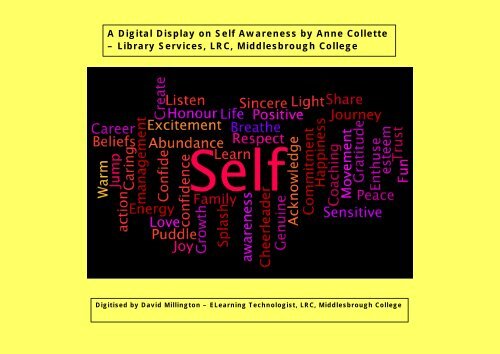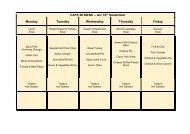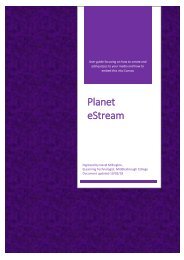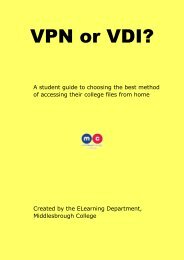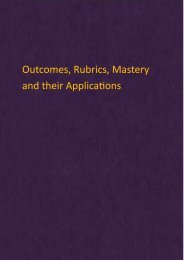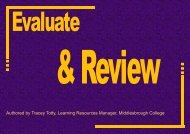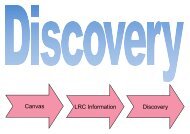Digital Display
A display on Self Awareness
A display on Self Awareness
Create successful ePaper yourself
Turn your PDF publications into a flip-book with our unique Google optimized e-Paper software.
A <strong>Digital</strong> <strong>Display</strong> on Self Awareness by Anne Collette<br />
– Library Services, LRC, Middlesbrough College<br />
Digitised by David Millington – ELearning Technologist, LRC, Middlesbrough College
Self-Awareness – Who Am I?<br />
Introduction<br />
We usually identify our existence with our position in society, our friends and family, the needs and desires of our body, and<br />
the emotional and intellectual expressions of our mind. For example: We might say ‘I am a student studying economics, I<br />
have three sisters and live in London’. We rarely take the time to contemplate the real nature of our existence; to ask the<br />
question, "Who am I?"<br />
Self-awareness is about learning to better understand why you feel what you feel and why you behave in a particular way.<br />
Once you begin to understand this concept you then have the opportunity and freedom to change things about yourself<br />
enabling you to create a life that you want. It’s almost impossible to change and become self-accepting if you are unsure as<br />
to who you are. Having clarity about who you are and what you want can be empowering, giving you the confidence to make<br />
changes.<br />
Try this challenge<br />
Think about describing yourself to another person without mentioning anything about the external things that are in your life,<br />
your friends, family, studying etc. Concentrate only on yourself, how you feel and behave, perhaps recognising some of your<br />
strengths and weaknesses.<br />
Did you manage to explore your thoughts, feelings and behaviours?<br />
It’s easy to get caught up in irrational thoughts and beliefs and live out internal dramas that can severely affect the way we<br />
perceive ourselves and consequently determine our feelings and actions. Relationships are easy until there is emotional<br />
turmoil. This is the same whether you are at work or in your personal life. When you can change the interpretation in your<br />
mind of what you think, you can change your emotions and shift the emotional quality of your relationships. When you can<br />
change the emotions in your relationships you open up entirely new possibilities in your life.<br />
Having a clear understanding of your thought and behaviour patterns helps you understand other people. This ability to<br />
empathise facilitates better personal and professional relationships.
Is self-awareness important?<br />
Self-awareness is important because when we have a better understanding of ourselves, we are able to experience<br />
ourselves as unique and separate individuals. We are then empowered to make changes and to build on our areas of<br />
strength as well as identify areas where we would like to make improvements. Self-awareness is often a first step to goal<br />
setting. Self-awareness is being conscious of what you're good at while acknowledging what you still have yet to learn. This<br />
includes admitting when you don't have the answer and owning up to mistakes.<br />
In our highly competitive culture, this can seem counterintuitive. In fact, many of us operate on the belief that we must<br />
appear as though we know everything all the time or else people will question our abilities, and then perhaps judge us. If<br />
you're honest with yourself, you'll admit that really the opposite is true. Because whether you acknowledge your weaknesses<br />
or not, everyone still sees them. So rather than conceal them, the person who tries to hide weaknesses actually highlights<br />
them, creating the perception of a lack of integrity and self-awareness.<br />
The Johari Window<br />
The Johari Window can be looked at from many angles and provides four basic forms of the Self (the Known, Hidden, Blind,<br />
and Unknown Self).<br />
The Known Self is what you and others see in you. This is the part that you are able to discuss freely with others. Most of<br />
the time you agree with this view you have and others have of you.<br />
The Hidden Self is what you see in yourself but others don’t. In this part you hide things that are very private about yourself.<br />
You do not want this information to be disclosed for the reason of protection. It could also be that you may be ashamed of<br />
these areas and feel a vulnerability to having your faults and weaknesses exposed. This area equally applies to your good<br />
qualities that you don’t want to advertise to the world due to modesty.<br />
The Blind Self is what you don’t see in yourself but others see in you. You might see yourself as an open-minded person<br />
when, in reality, people around you don’t agree. This area also works the other way. You might see yourself as a “dumb”<br />
person while others might consider you incredibly bright. Sometimes those around you might not tell you what they see<br />
because they fear offending you. It is in this area that people sometimes detect that what you say and what you do don’t<br />
match and sometimes body-language shows this mismatch.
The Unknown Self is the self that you cannot see, others can’t see it either. In this category there might be good and bad<br />
things that are out of the awareness of others and you. This might refer to untapped potential talents and skills that have yet<br />
to be explored by you, your friends, colleagues or managers.<br />
You may find the Johari Window quite useful as you discover who you are.<br />
Known<br />
Self<br />
Things we<br />
know about<br />
ourselves<br />
and others<br />
know about<br />
us.<br />
Blind Self<br />
Things<br />
others know<br />
about us<br />
that we do<br />
not know.<br />
Hidden<br />
Self<br />
Things we<br />
know about<br />
ourselves<br />
that others<br />
do not<br />
know.<br />
Unknown<br />
Self<br />
Things<br />
neither we<br />
nor others<br />
know about<br />
us.
Observation and Value Judgments: Looking at self-awareness and acceptance<br />
Some people say we need judgments to be able to live in this world. “How could I make decisions if I didn’t judge? Isn't that<br />
how we make decisions?”<br />
A distinction between a value judgment and an observation is as follows:<br />
In an observation we see, hear and feel what is happening around us. We then state what we see. When we’re judging<br />
something, we go one step further in the process of observation and add in a subjective evaluation. We label the event as<br />
either “good”, or “bad”. It then becomes a value judgment. Placing a value judgement upon the event affects our decision<br />
making process because the event now has a label and affects how we respond.<br />
How does this apply to accepting yourself?<br />
You first make an observation about yourself, ("I am embarrassed in social situations”) then decide if it’s a good or bad<br />
thing to be ("It's bad to be embarrassed in social situations"). When we judge something about ourselves as “bad”, it<br />
becomes impossible to accept it and be okay with that part of yourself. However, it is possible to accept how you<br />
behave in social situations and still know you want to change it and perhaps work towards making improvements.<br />
What if you were to drop your value judgments and simply saw “what is” then identified what you wanted and why? It<br />
could totally transform your experience. It might lead to new discoveries about yourself. For example: Being<br />
embarrassed in social situations is something that you have observed about yourself, it doesn’t have to have any<br />
value judgement placed upon it, and this could be described as “what is”. Then identify how you would like to behave<br />
in social situations and why, this is “what you want and why”. Having established this you are more able move forward<br />
in a positive way, as you are now aware of how you would like things to be and more accepting as to how they actually<br />
are.<br />
Perhaps you would find a well of acceptance for yourself and others that you never knew existed.<br />
Perhaps you would notice the less you judge yourself, the less you'll judge others. And maybe, the experience of<br />
acceptance would give you the solid foundation to move forward in creating yourself and your life in a way that is more<br />
satisfying.<br />
Information taken from The University of Warwick website: University Counselling Service at<br />
https://www2.warwick.ac.uk/services/tutors/counselling/informationpages/selfawareness/
https://internationalcommunity.dk/en-US/Your-guide-to-DK/Living-Working/How-to-get-a-career-in-Denmark/Self-awareness.
https://www.americannursetoday.com/enhance-self-awareness-authentic-leader/
http://www.rohitsinghsengar.com
Noun<br />
[mass noun]<br />
Conscious knowledge of one’s own character and<br />
feelings.<br />
https://en.oxforddictionaries.com/
Self-Awareness June 2017 Bibliography<br />
https://www2.warwick.ac.uk/services/tutors/counselling/informationpages/selfawaren ess/<br />
https://www.americannursetoday.com/enhance-self-awareness-authentic-leader/<br />
http://bluedoodle.com/page/self-awarness/ (sic)<br />
https://create.canterbury.ac.uk/13212/1/Transforming_Primary_Care_12th_March_2 015.pptx<br />
http://www.emberrealresults.com/people-skills-training/self-awareness/ https://internationalcommunity.dk/en-US/Your-guide-to-<br />
DK/Living-Working/How-toget-a-career-in-Denmark/Self-awareness<br />
http://www.internationalintegrativehealthinstitute.com/iihi-blog/2015/7/29/personalawareness-as-a-first-step-to-self-care.<br />
http://janeschuette.com/self-awareness-is-the-key-to-your-success/ https://penmythought.wordpress.com/.<br />
http://www.rohitsinghsengar.com/
A <strong>Digital</strong> <strong>Display</strong> on Self Awareness by Anne Collette<br />
– Library Services, LRC, Middlesbrough College<br />
Digitised by David Millington – ELearning Technologist, LRC, Middlesbrough College


